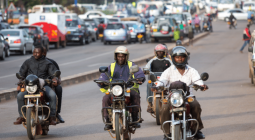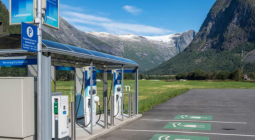Africa: Women gain, cities breathe easier with e-motorcycles
By the United Nations Environment Programme (UNEP)
As the streets of Kampala, Uganda come to life early in the morning, Dorothy Namawejje fastens her helmet and revs the engine of her electric motorcycle. Namawejje, a single mother of two, is a taxi driver who ferries passengers around the city’s frenetic roads, her bike humming quietly beneath her.
The job pays well above what she was making a few years ago as a traffic warden. But more than that, Namawejje considers herself a pioneer in a country where motorcycle taxi drivers are almost always men.
“Before, I feared the road. Now, I own my future,” she says.
Namawejje is one of a growing number of African women who are finding work in the fast-growing electric vehicle industry and its offshoots.
Potential of e-motorcycles in Africa
For many the rapid development of the sector is opening up careers long inaccessible, like taxi driving and motorcycle repair. Along with reducing gender inequality, experts are hopeful the shift to electric two-wheelers could also help Africa’s cities clear their increasingly smog-filled air.
“Air pollution is the leading environmental cause of premature death,” says Sheila Aggarwal Khan, the Director of the Industry and Economy Division at the United Nations Environment Programme (UNEP). “Electrifying fleets is a vital step for improving public health – and saving lives.”
Motorcycles are the backbone of transit networks in many African cities.
There are more than 20 million such vehicles across the continent. Most run on petrol, spitting out planet-warming greenhouse gasses along with a range of harmful chemicals, like fine particulate matter and nitrous oxide.
Over a recent four-year period outdoor air pollution – much of it from vehicles – led to the premature deaths of more than 7,200 people in Kampala alone, found Ugandan researchers.
Motorcycles are also largely driven by men. In Uganda, for example, women make up less than 1 percent of motorcycle taxi operators.
Women in Kenya, Uganda embrace e-motorcycles revolution
But a UNEP-led project in Kenya and Uganda is aiming to alter that calculus. Funded by the German Federal Ministry for Economic Cooperation and Development (BMZ), it has trained more than 100 women as electric motorcycle operators, mechanics and entrepreneurs. Those women include Kampala’s Namawejje.
The project’s goal is to reduce pollution – electric vehicles have no tailpipe emissions – while creating economic opportunities.
Homa Bay, Kenya sits across the sprawling Lake Victoria from Kampala. Here, the UNEP-backed project trained women in how to maintain solar panels and fix electric-vehicle charging infrastructure, among other things.
Carine Akoth, a 27-year-old mother of two, is one of the women who passed through the programme. She learnt to assemble electric motorcycles.
“Before this training, I had never even touched a motorbike – let alone imagined assembling one,” she says. She now wants to open an electric bike repair shop.
The Homa Bay centre buzzes with similar stories. Hellen Atieno, a 28-year-old single mother, found her calling as a solar energy technician.
“Learning about solar panels and battery systems has opened my eyes to the world of clean energy,” she says.
“I used to believe this field was only for men, but now I see that women can lead and excel here too.”
Challenges prohibiting women from entering sector
But cultural barriers persist. In Kenya only 5% of electric vehicle drivers are women. A report by UNEP partner WeTu found men often expressed “discomfort” with their wives working in the taxi industry, long viewed as a traditionally male field. In Homa Bay, some trainees dropped out due to family pressure.
Still, programmes like those in Homa Bay and Kampala are helping to break down stereotypes, says Liliane Felix. She is the director of non-profit organisation Women Rising for Africa and creator of the UNEP-supported Women on Wheels project, which helps provide electric bikes to women in the Lake Victoria area.
“We are confronting the deep-rooted gaps in gender inclusion, opening doors to real opportunities that were previously out of reach and reshaping what’s possible for women in Africa,” Felix says.
Appetite for e-motorcycles in Africa
The transport industry is the world’s second-largest emitter of planet-warming greenhouse gasses, following only the power sector.
Demand for motorcycles is spiking across Africa – a hunger Kenya and Uganda are aiming to sate with electric vehicles. In both countries, the majority of electricity comes from renewable sources, meaning electric motorcycles have a relatively low carbon footprint.
While less than 1% of all African motorcycles are electric, sales of these vehicles jumped 40% in 2024, found the International Energy Agency. That rise is being driven in part by economics. The electric motorcycle maker Zembo, a UNEP partner, found riders save $500 yearly on fuel compared to petrol bikes.
The surging popularity of electric motorcycles has come even though many Africans are not connected to the power grid. That has left observers especially bullish about the technology’s future.
“Africa isn’t waiting for charging infrastructure to leapfrog into electric mobility – it’s pioneering its own model,” says Rob De Jong, Head of UNEP’s Sustainable Mobility Unit.
The support for motorcycle taxis is part of a broader UNEP effort to stoke the uptake of electric vehicles in the developing world. Last year, the organisation was active in 60 countries.
E-motorcycles in Africa an economic game-changer for some
Back in Kampala Natumbwe Veronica, a single mother of five, says driving an electric motorcycle taxi has helped pay for food, shelter and her children’s school fees. Nearby, tour guide Nattabi Ruth, who also drives an electric two-wheeler, says projects like those backed by UNEP are helping to shatter stereotypes.
“People think women don’t have experience,” says the 41-year-old. “But we’re proving them wrong every day.”
On 7 September the world will mark the International Day of Clean air for blue skies. The day is designed to showcase ways countries can limit air pollution, which causes nearly 8.1 million premature deaths annually.
UNEP’s Global Electric Mobility Programme supports more than 60 countries in the Global South with $130 million in grants to transition away from fossil fuels in the transportation sector.
The programme is funded by the Global Environment Facility, Germany’s IKI Climate Initiative and the Federal Ministry for Economic Cooperation and Development (BMZ), the Climateworks Foundation, the European Union and the FIA Foundation.
In Kenya and Uganda, UNEP’s Global Electric Mobility Programme is running the E-Mobility as a Driver for Change project. Funded by the German Federal Ministry for Economic Cooperation and Development (BMZ), it has trained more than 100 women across Uganda and Kenya as solar energy technicians, and electric two-wheeler operators and mechanics.
Cover photo: In Homa Bay, Kenya women are learning how to assemble and repair electric motorcycles while also getting training in entrepreneurship. Source: Women Rising for Africa





